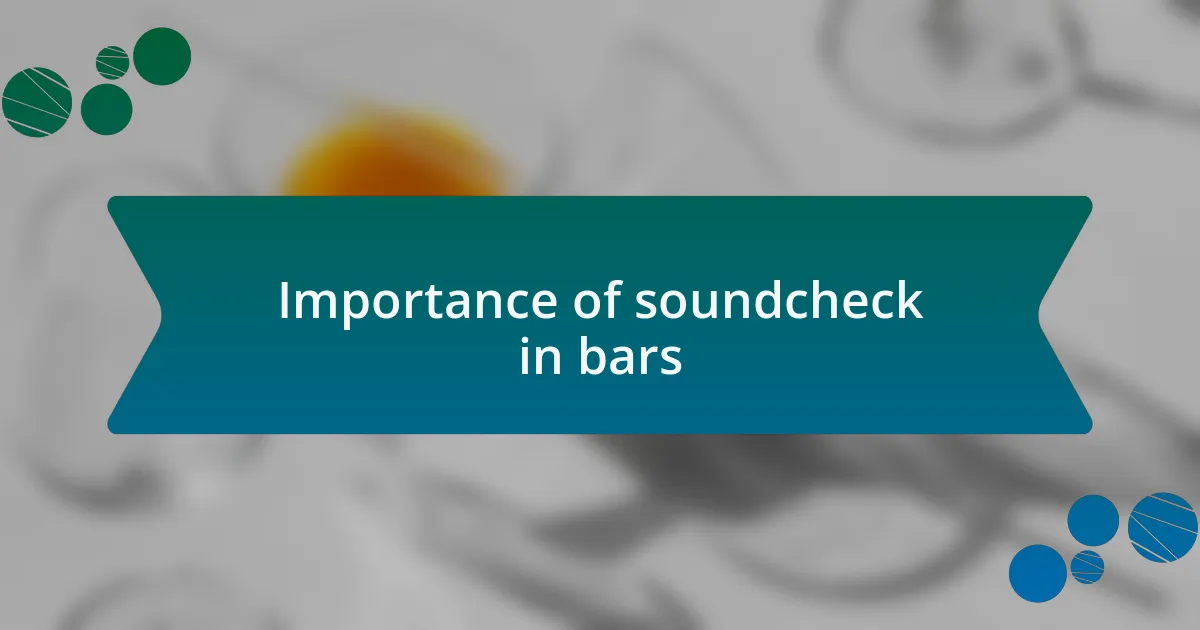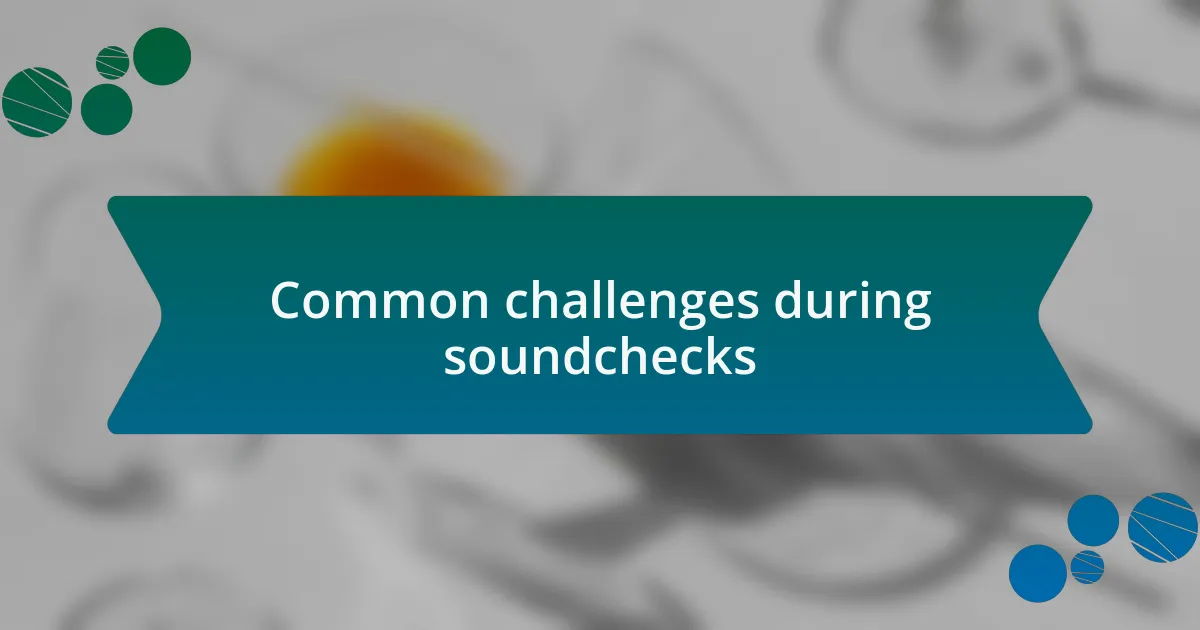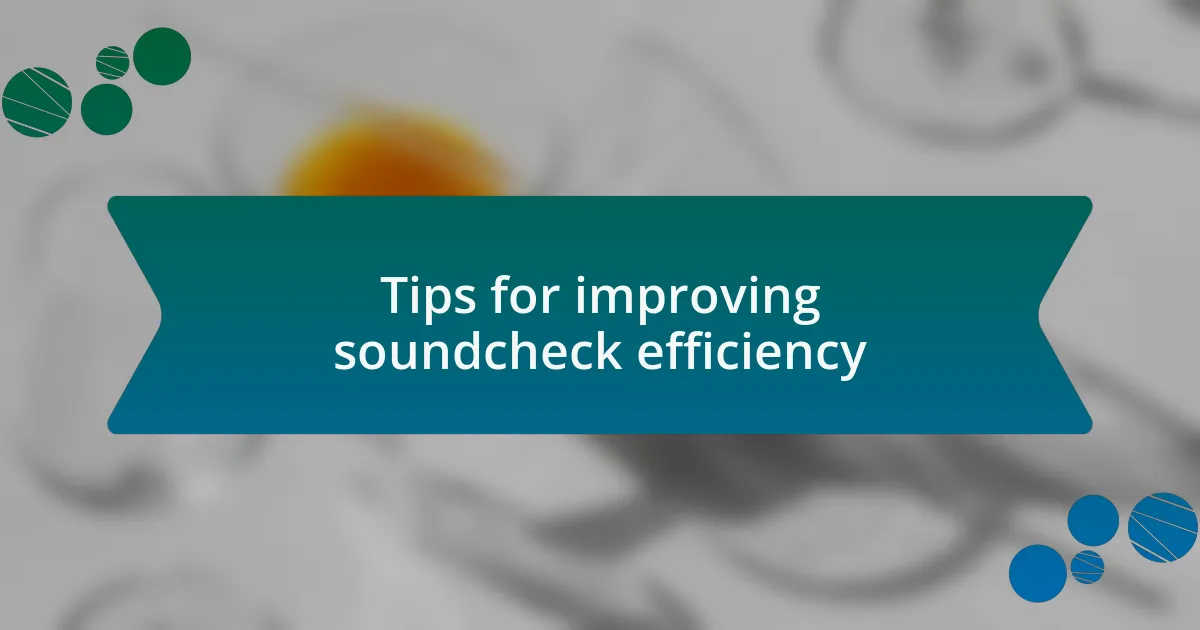Key takeaways:
- Soundchecks are essential for fine-tuning audio elements, ensuring clarity and balance during live performances.
- Challenges such as unpredictable acoustics, equipment malfunctions, and time constraints can significantly impact soundchecks and overall performance quality.
- Effective communication and preparation, including creating checklists and arriving early, can enhance the efficiency of soundchecks.
- Embracing feedback during soundchecks fosters collaboration and can lead to significant improvements in sound quality.

Understanding live soundcheck
When I first experienced a live soundcheck, I realized it’s not just about adjusting the knobs on a mixing board. It’s a crucial moment where the audio engineer fine-tunes the sound to ensure that every note resonates perfectly with the audience. Have you ever wondered how a band can sound so polished even in an intimate setting?
I remember a particular night where the atmosphere transformed within minutes during soundcheck. The lead guitarist played a few chords, and I could literally feel the energy shift in the room. The way each element comes together—vocals blending with instruments and the audience’s reaction—is truly magical and speaks to the artistry behind live performances.
Soundchecks help identify potential issues before they become distractions during the show. It’s not just about volume; it’s about clarity and balance. I often find myself reflecting on how this behind-the-scenes work can elevate an ordinary evening into something extraordinary for everyone present. Have you ever thought about the impact of sound quality on your experience at a show? Every detail matters, and that’s what makes soundchecks so essential.

Importance of soundcheck in bars
The soundcheck in bars serves as a bridge between the musicians and their audience, ensuring that every note has the chance to resonate fully. I recall a time when a local band was rehearsing for their first gig—they struggled with the sound levels at first but after fine-tuning everything, the change was astonishing. It made me realize how crucial it is for artists to hear their sound accurately to deliver their best performance.
During one of the soundchecks, I noticed how the room seemed to come alive as adjustments were made. It’s almost like witnessing a painter add the finishing strokes to a masterpiece; each tweak enhances the overall experience for everyone. Have you ever experienced a live show where sound issues took you out of the moment? That’s why barring any technical hiccups during a performance is essential; preparation typically means a smoother and more enjoyable show for everyone involved.
Moreover, soundchecks play an integral role in building the rapport between the performers and the venue staff. I remember chatting with a sound engineer who spoke passionately about how a thorough soundcheck enables him to catch nuances like reverb or feedback that might disrupt the performance. It’s a reminder that every sound, from the emotional undertone of a vocal to the punch of a drumbeat, deserves attention. Without a solid soundcheck, these little details can easily go unnoticed, affecting the overall vibe of the night.

Common challenges during soundchecks
When it comes to soundchecks, one of the biggest hurdles is often the unpredictable acoustics of the venue. I vividly remember a gig where the sound bounced off the walls in a chaotic dance, making it impossible for the band to find their balance. It was frustrating to watch them struggle, and I couldn’t help but think—how do you tweak your sound when the room itself seems to fight back?
Another challenge is equipment malfunction, which can throw an entire soundcheck off course in mere moments. During one memorable soundcheck, we encountered a faulty microphone that resulted in embarrassing feedback. I could see the sound engineer’s face change as he scrambled to fix it, and it got me wondering—how do performers stay focused when technical hiccups threaten to disrupt their flow?
Lastly, timing can be a real issue, especially when multiple acts are sharing the stage. I once witnessed a small band trying to fit in their soundcheck in a mere 15 minutes before the next act. Their anxiety was palpable, and it made me realize just how much pressure performers are under. What’s the point of a rushed soundcheck if it sacrifices quality? It was a valuable lesson in the importance of planning ahead, something I believe can drastically improve the overall performance experience.

Tips for improving soundcheck efficiency
One of the most useful tips I’ve picked up over the years is to always arrive early to the venue. I learned this lesson the hard way during a particularly hectic gig when a last-minute band booking left us scrambling. The additional time not only allows for a thorough soundcheck but also offers the chance to adjust to the venue’s unique acoustics. Isn’t it fascinating how just a bit of extra time can drastically change the quality of the performance?
In my experience, creating a checklist can be a game changer. Before a soundcheck, I make a simple list of equipment to test and specific settings to check. This practice helps eliminate the stress of forgetting essential gear or settings. I remember one night when, thanks to my checklist, I realized I hadn’t set up the monitors properly. Catching that early saved us from what could have been a chaotic performance.
Finally, open communication between performers and sound engineers is vital. I’ve often seen how a quick chat can clarify expectations and lead to a smoother soundcheck. One time, a lead singer casually mentioned their preferred vocal levels, resulting in a much more harmonious setup. How much easier is it to focus on the performance when everyone is on the same page? Creating that dialogue makes all the difference, turning what could be a stressful experience into a collaborative effort.

Final thoughts on soundcheck learning
Soundcheck learning is an ongoing journey for anyone involved in live sound. I recall a night where a minor adjustment in an instrument’s volume during soundcheck transformed a lackluster performance into an unforgettable experience. It’s these little refinements that often make the biggest difference, and they remind me that the process is as much about listening as it is about adjusting.
One key takeaway I’ve had is the importance of embracing feedback during soundchecks. After a recent gig, a band member casually pointed out how the bass wasn’t punching through the mix, and that simple cue led us to tweak the EQ settings for a richer sound. How often do we overlook these moments where collaboration can really shine? Learning to welcome such insights not only enhances the overall sound but also strengthens partnerships within the team.
In reflecting on soundcheck learning, I’m reminded that it’s a blend of preparation, communication, and adaptation. Each soundcheck is a unique puzzle, and I relish piecing together what works best in different venues. Ultimately, the lessons learned from these experiences are invaluable, guiding us toward not just better sound, but also more cohesive performances.